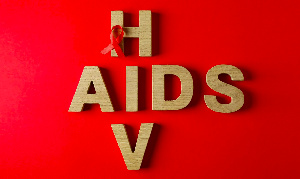Health News of Saturday, 9 March 2024
Source: www.ghanaweb.live
2024-03-09National AIDS Control Programme aims to test 1.9 million people in 2024
 The campaign is part of a comprehensive plan under the Global Fund’s Grant Cycle 7
The campaign is part of a comprehensive plan under the Global Fund’s Grant Cycle 7
The National AIDS Control Programme (NACP) in Ghana has set a target to test 1.9 million people in 2024 as part of a comprehensive plan under the Global Fund’s Grant Cycle 7, Ghana News Agency reports.
Dr. Stephen Ayisi Addo, the Programmes Manager, outlined the objectives, revealing that an estimated 1.1 million pregnant women would also be tested under the
Read full articleprogram. Ghana has received a total of 234 million dollars under the Global Fund's Grant Cycle 7 to combat HIV, TB, and Malaria from 2024 to 2026, with HIV receiving close to 100 million dollars for interventions across the country.
As part of the 2024 activities, the NACP plans to launch an HIV Case Based Surveillance program, roll out an E-tracker for Antiretroviral Therapy (ART), and implement triple elimination interventions for HIV, Syphilis, and Hepatitis B. Special focus will be given to HIV interventions for special groups and community interventions, including differentiated ART service delivery and strengthening community groups and models.
The NACP aims to enhance guidelines and job aids, improve HIV-positive baby units, the pregnancy registry, and integrate ART into non-communicable disease care. Other planned activities include the pilot of a cervical cancer screening program, operational research in key areas, and the expansion of family-based index testing. A revised HIV testing algorithm will also be introduced in the year.
Dr. Addo emphasized the importance of addressing data challenges and staff attrition for HIV care. He called for efforts to optimize electronic medical records and promote a pediatric HIV implementation plan.
Mr. Ernest Amoabeng Ortsin, Acting Chairman of the Country Coordinating Mechanism of the Global Fund, highlighted the significant investment of 1.2 billion dollars in the country, supporting 254,000 people on TB and HIV treatment. He appealed to the Government to ensure the availability of domestic resources, including counterpart funding, to ensure a successful fight against these diseases.
The annual joint TB/HIV review brought together stakeholders from various health organizations, including the WHO, UNICEF, and CSOs, along with health research institutions.











